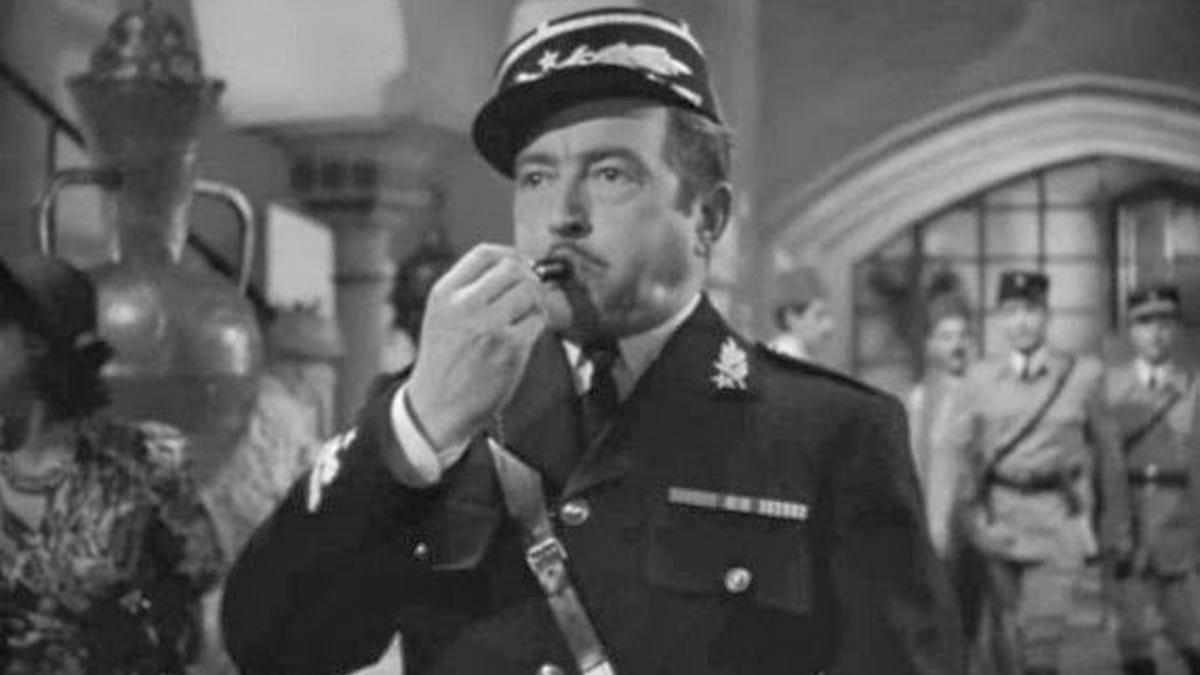Intelligence chief Clapper cites 'Casablanca' in dismissing Merkel mess
Director of National Intelligence James Clapper refers to a famous scene from the classic film in downplaying the tapping of German Chancellor Angela Merkel's cell phone.

You must remember this: A kiss is just a kiss, a spy is just a spy.
That seems to be the attitude of top US intelligence officials toward the uproar over reports of United States spying on Europe's leaders and citizens.
At a congressional hearing Tuesday, Director of National Intelligence James Clapper cited a famous scene from "Casablanca" in dismissing the outcry over the tapping of German Chancellor Angela Merkel's cell phone.
"Some of this reminds me a lot of the classic movie 'Casablanca': 'My God, there's gambling going on here!'" Clapper said during a public hearing before the House Permanent Select Committee on Intelligence. The hearing was focused on potential reforms to the Foreign Intelligence Surveillance Act, which is meant to provide oversight of intelligence gathering by US agencies.
As you may recall, the scene has the French Capt. Renault (Claude Rains) closing down the cafe run by American Rick Blaine (Humphrey Bogart) on the pretext that it's a front for a casino.
"I'm shocked -- shocked -- to find that gambling is going on in here!" Renault says, at which point, of course, he's approached by a croupier who hands him a wad of cash. "Your winnings, sir." "Oh, thank you very much."
Asked about spying on the heads of foreign governments, Clapper called such monitoring of "leadership intentions" a "hardy perennial" of the intelligence trade and said it was one of the first things he learned in intelligence school back in 1963. He also answered "absolutely" when asked if US allies had spied on the states.
After a none-too-subtle game of semantics by the White House last week regarding potential surveillance of Merkel, anonymous US officials told The Wall Street Journal on Monday that the US had, indeed, spied on the German leader.
Sen. Dianne Feinstein, chairwoman of the Senate Intelligence Committee, issued a statement the same day saying that the senate committee hadn't been satisfactorily informed by the NSA of spying on allies and that as a result, the committee will "initiate a major review into all intelligence collection programs." Feinstein, previously a staunch supporter of the NSA's bulk collection of phone and Internet data, also said President Obama had been unaware that Merkel's communications "were being collected since 2002."
The Los Angeles Times, however, cited anonymous sources Monday in reporting that the White House and the State Department had signed off on the spying, and remarks by Clapper at Tuesday's House hearing also left room for doubt.
"We do only what the policymakers ask us to do," Clapper said. But what, exactly, the president might or might not be aware of was unclear. Clapper said that though the executive branch knows what the NSA's "collection priorities" are, the spy agency doesn't necessarily drill down, in briefings with the White House, to the level of individual "selectors" it uses to gather its intelligence. Those selectors would be individual phone numbers and/or e-mails.
The House committee couldn't agree on whether it had been informed of the spying on allies. Rep. Adam Schiff (D-Calif.) suggested the NSA hadn't told the committee, and he called Clapper out, saying that "plainly not all selectors are equal" and that one belonging to the head of state of a US ally should certainly be brought to the special attention of policymakers.
Committee Chairman Mike Rogers (R-Mich.), however, said the information was available to any committee member willing to put in the necessary time to comb through the reports provided by the NSA, to which Schiff objected, "it's not for lack of doing homework."
Also at the hearing, NSA Director Keith Alexander said recent reports that the agency had intercepted millions of phone calls in Italy, France, and Spain were "completely false" and that the data had instead been provided to the NSA by foreign partners.
"This is not information that we collected on European citizens," Alexander said. "It represents information that we and our NATO allies have collected in defense of our countries and in support of military operations."

